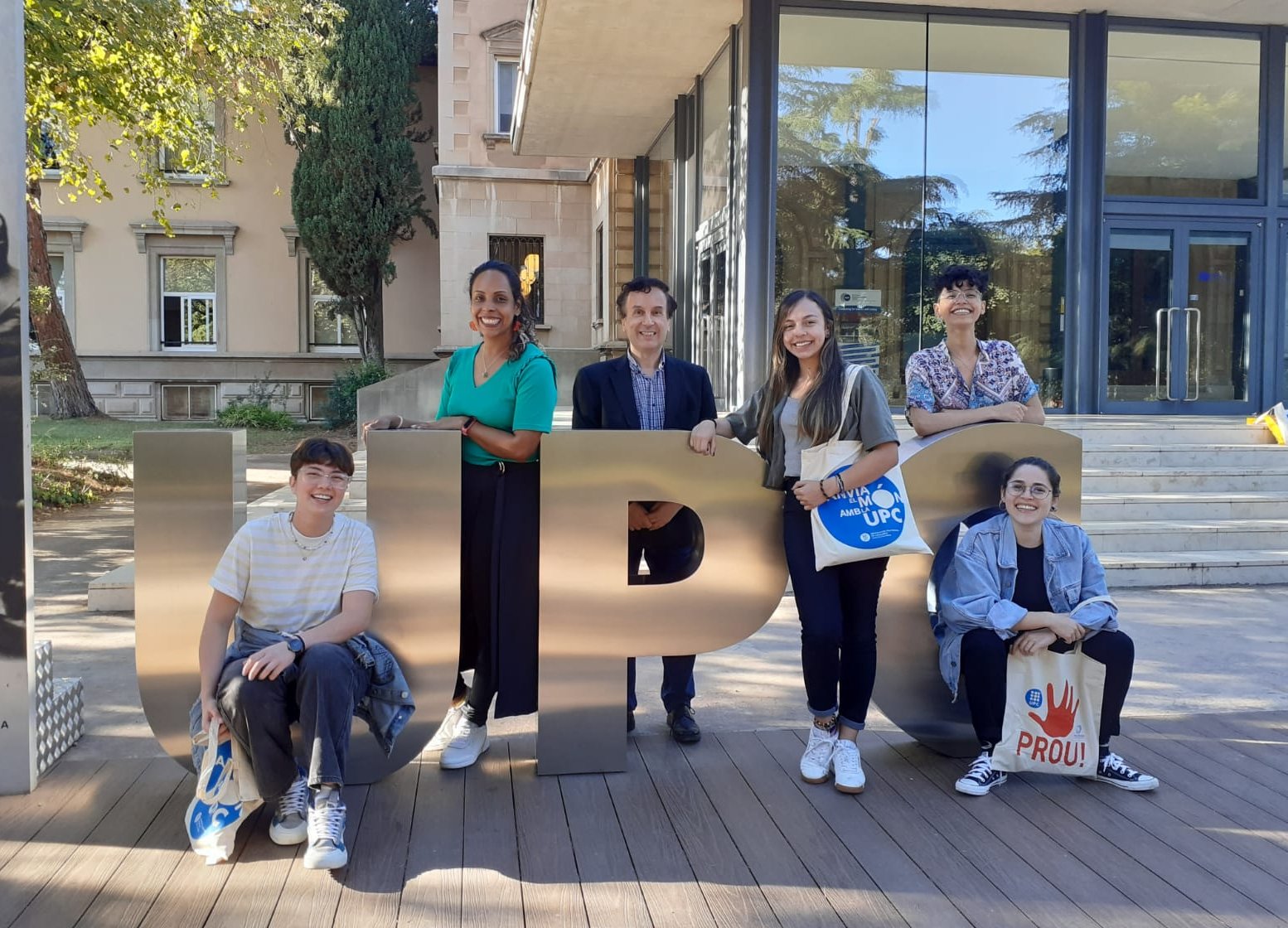‘Vera Gravitas’, the female team winner of the Barcelona ZeroG Challenge, takes off its experiment in zero gravity

'Vera Gravitas' seeks to analyse how the solder pond of microgravity electronic component plates is arranged, a little-studied research topic that may have many applications in the immediate future
The Barcelona ZeroG Challenge is coordinated by the professor at the Barcelona East School of Engineering (EEBE) of the UPC and IEEC member, Dr. Antoni Pérez-Poch, researcher in microgravity science and technology
Last 5 October, the winning women's team of the Barcelona ZeroG Challenge 2021 successfully flew their hypogravity experiment at Sabadell airport, consisting of a total of 20 parabolas with a hypogravity exposure time of 8 seconds per parabola.
The team is composed by four female students from the University of Antioquia (Medellín, Colombia): Luisa Fernanda Mendoza (spokesperson), Paulina Quintero, Oriana Mejía and María del Pilar Monsalve, who named themselves 'Vera Gravitas', which in Latin means true gravity and refers to Dr. Vera Rubin, a famous female astronomer who made important contributions to science.
This competition is led by the Universitat Politècnica de Catalunya · BarcelonaTech (UPC), in cooperation with the Aeroclub Barcelona Sabadell and the international student association Space Generation Advisory Council (SGAC), with the aim of promoting aerospace research among youth and fostering new vocations in this field. The project is coordinated by the UPC Professor and member of the Institute of Space Studies of Catalonia (IEEC — Institut d’Estudis Espacials de Catalunya), Dr Antoni Pérez-Poch.

The four student members of the 'Vera Gravitas' team, from the University of Antioquia, and their mentor (left). Credits: UPC
The call was open to teams of university students from all around the world proposing the design of an original experiment that could be carried out in zero gravity inside the cabin of an aerobatic plane. This platform has been used by the UPC in a pioneering way in the world since 2011 to carry out experiments in which its main characteristic is exposure to the absence of gravity.
For this edition, a total of 16 proposals were received from 16 different countries, both from Europe and America and Asia. The final selection was made in January 2022 by a jury of education experts from the European Space Agency (ESA).
The students—who are members of the Colombian Association of Aerospace Women, which aims to arouse women's interest in this science—focused on analysing the deposition of tin droplets on electronic components in the absence of gravity. This research topic is little studied and may have many applications in the immediate future.
In addition, they have a mentor, Professor Liliana Marcela Bustamante Goez, from the Department of Mechanical Engineering at the same University of Antioquia, and they have been able to prepare their experiment during a brief stay at the Computer Science and Microgravity Laboratory of the Barcelona East School of Engineering (EEBE) of the UPC.
Likewise, the team ‘Vera Gravitas’ has worked together with this laboratory during 2022 to adapt the experiment to the particular characteristics of the CAP10B aerobatic plane with which the flight has been carried out. In addition, they received a grant of 2,500 euros to carry out the experiment, and also had help from the Barcelona City Council and other sponsors.
‘Barcelona ZeroG Challenge’, together with the scientific contribution of 'Vera Gravitas' experiment, have already been the subject of a scientific publication in the proceedings of the 73rd International Astronautical Congress (IAC 2022), the most important in its field, held in Paris from 18 to 22 September.
The 'Vera Gravitas' team, accompanied by Dr Perez-Poch, were received on 4 October by the UPC Vice-Rector for Social Responsibility and Equality, Dr Fina Antonijuan, who highlighted the importance of these actions to create role models for women in STEAM studies and promote scientific and technical studies.
‘Barcelona ZeroG’ Challenge aims to promote interest in science and technology in university students, and to bring space research closer to both students and the general public.
Links
– IEEC
– Computer Science and Microgravity Laboratory (EEBE-UPC)
– Barcelona ZeroG Challenge
– 'Vera Gravitas' team
More information
The Institute of Space Studies of Catalonia (IEEC—Institut d’Estudis Espacials de Catalunya) promotes and coordinates space research and technology development in Catalonia for the benefit of society. IEEC fosters collaborations both locally and worldwide and is an efficient agent of knowledge, innovation and technology transfer. As a result of 25 years of high-quality research, done in collaboration with major international organisations, IEEC ranks among the best international research centers, focusing on areas such as: astrophysics, cosmology, planetary science, and Earth Observation. IEEC’s engineering division develops instrumentation for ground- and space-based projects, and has extensive experience in working with private or public organisations from the aerospace and other innovation sectors.
IEEC is a private non-profit foundation, governed by a Board of Trustees composed of Generalitat de Catalunya and four other institutions that each have a research unit, which together constitute the core of IEEC R&D activity: the Universitat de Barcelona (UB) with the research unit ICCUB — Institute of Cosmos Sciences; the Universitat Autònoma de Barcelona (UAB) with the research unit CERES — Center of Space Studies and Research; the Universitat Politècnica de Catalunya · BarcelonaTech (UPC) with the research unit CTE — Research Group in Space Sciences and Technologies; the Spanish Research Council (CSIC) with the research unit ICE — Institute of Space Sciences. The IEEC is a CERCA (Centres de Recerca de Catalunya) center.
Contacts
IEEC Communication Office
Barcelona, Spain
E-mail: comunicacio@ieec.cat
Lead Researcher at IEEC
Barcelona, Spain
Antoni Pérez-Poch
Institute of Space Studies of Catalonia (IEEC)
Universitat Politècnica de Catalunya · BarcelonaTech (UPC)
E-mail: perezpoch@ieec.cat, antoni.perez-poch@upc.edu
